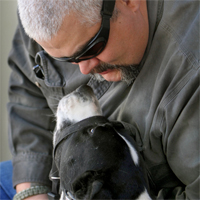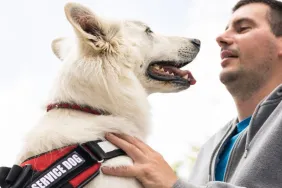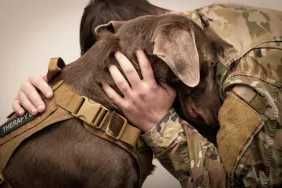After his second tour of duty in Iraq, Sergeant Kevin Brackney had a tough time adjusting to life back home. He often felt scared and anxious, especially during quiet hours when he tried to go to sleep.
“It actually got to the point that whenever I came back, I would have to play the opening scene of Saving Private Ryan to get to sleep because I was so used to the noise,” Sgt. Brackney tells CBS News.
For two long, arduous years after returning to the U.S., Sgt. Brackney suffered with a condition that many military veterans face: post-traumatic stress disorder, or PTSD.
According to Veterans and PTSD, the often-debilitating psychological illness can have devastating consequences, affecting the veteran’s everyday life, their relationships, their ability to land and keep gainful employment, and much more. A 2012 study published in the American Journal of Public Health reveals that just being in the military doubles one’s risk of committing suicide. An estimated 5,000 veterans commit suicide each year after returning from their deployments mere shells of their former selves, struggling to cope with painful memories, flashbacks, and severe bouts of anxiety.
Luckily for Sgt. Brackney, the veteran had a partner in his fight to treat his PTSD — his wife, Gianine. Worried for her husband, Gianine knew she’d found a potential solution after watching a television program about Puppies Behind Bars, an organization that teaches prison inmates to care for and train service dogs for veterans like Sgt. Brackney who suffer from PTSD.
Though Sgt. Brackney was initially hesitant to apply, Gianine eventually convinced her husband to give a service dog a try. And it’s a good thing he listened to his wife, because as soon as Puppies Behind Bars-trained black Labrador Retriever Nyma came into his life in January 2013, Sgt. Brackney’s whole outlook changed completely.
Nyma, who knows more than 80 different commands, helps Sgt. Brackney get through every day, one day at a time. If he gives the command “block,” Nyma knows to lie in front of him to prevent someone from coming to close. But that’s not the only anxiety-reducing command Nyma has in her toolkit.
“My favorite one is ‘watch my back,” says Sgt. Brackney, “where she stands on my left side and she faces backwards and if any one is coming from behind, she’ll notify me.”
Nyma also reminds Sgt. Brackney of one of the good signs he saw while serving in Iraq, he explains.
“She is also a visual indicator for me. When we were out and about convoying from one place to the other, when we saw kids and we saw dogs, we knew we were safe,” Sgt. Brackney says.
Meanwhile, Rio Rancho, N.M., organization Paws and Stripes is busy training soon-to-be service dog Cooper, a black-and-white Pit Bull Terrier mix rescued from the Albuquerque Animal Welfare Department’s West Side Shelter three short weeks ago. Veteran Jack Hill felt an immediate connection with Cooper, and Paws and Stripes is working hard to make sure Cooper will not only be able to be Hill’s much-needed companion, but a big help, too.
After serving in the U.S. Navy from 1993 to 2007, serving in Bosnia, Haiti, and three separate deployments to Iraq, 39-year-old Hill was diagnosed with a traumatic brain injury and severe PTSD. Soon, with Cooper’s help, Hill will be able to enjoy life with his wife, 5-year-old son, and his retiring service dog, Captain.
“He has the heart, just not the legs,” Hill says of Captain, who will live out his remaining years as the Hill family’s beloved pet. When Cooper is ready to take the reigns, Hill says Captain will enjoy the good life back home.
It’s people like Jack Hill, and special dogs like Captain and Cooper, that make all the effort worth it, says Paws and Stripes founder and CEO Lindsey Stanek.
“It’s always just really awesome to be able to see any of my veterans interact with a service dog, especially a new dog, and seeing their bond and how they communicate with each other,” Stanek explains.
As part of his training regiment, Cooper is learning how to perform tasks for Hill. Soon, the Albuquerque Journal reports, he will be able to pick up Hill’s keys, remind Hill when to take his migraine medication, and wake Hill up when the struggling veteran is having nightmares.
Stanek knows firsthand how bad PTSD can be. She started Paws and Stripes shortly after her husband Jim returned from his third tour of duty in Iraq with a brain injury and a bad case of PTSD — just like Jack Hill. Now a few short years later, Stanek’s organization has an annual budget of more than $300,000, and she’s been able to help place 45 dogs with veterans in need. There are currently around 150 veterans on the waiting list at Paws and Stripes, and the list grows every day.
If you would like to learn more about what goes into training these remarkable service dogs with our wounded warriors, or to find out how you can help more veterans get service dogs of their very own, visit the Puppies Behind Bars or Paws and Stripes websites. And for more amazing stories of service dogs and the wounded heroes they help, check out this awesome service dog tribute page on HLNtv.com or check out Stories of Courage: K9s for Warriors, premiering Veteran’s Day, Monday, November 11, at 7:00 p.m. EST on HLN.
Sources: HLNtv.com, Albuquerque Journal, Veterans and PTSD, CBS News









